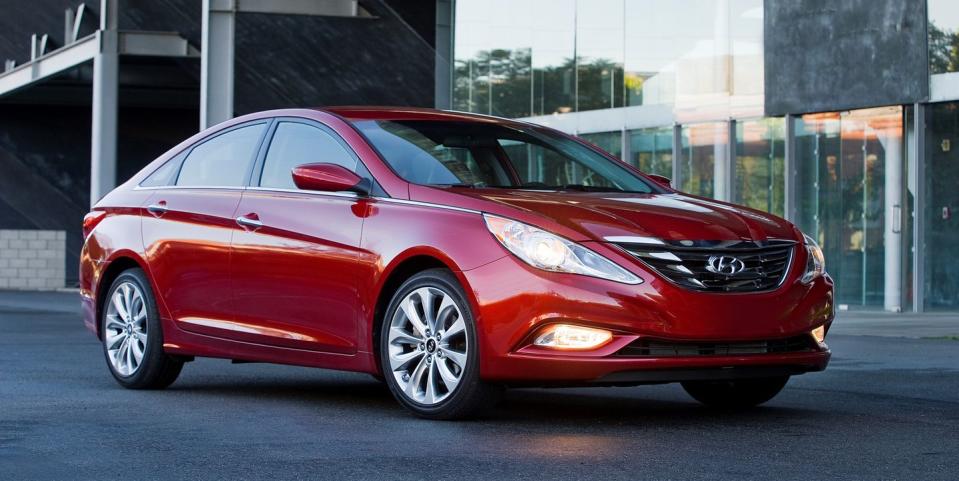NHTSA Investigating Three Million Hyundai and Kia Vehicles for Fires

At risk are 2010–2015 Hyundai and Kia models with 2.0-liter and 2.4-liter engines, many of which have been previously recalled for engine failures.
The investigation is not a recall, but, if the government determines a defect exists, it can force a recall.
Owners have reported their cars catching on fire after stalling. All of the fires under investigation occurred without a crash.
Hyundai and Kia will now have to answer why they haven't recalled nearly three million cars with potentially defective engines that may catch fire. The National Highway Traffic Safety Administration (NHTSA) opened an investigation this week after reviewing more than 3000 reports of fires that started without any crashes—and in some cases, with the engine reported to have been off entirely.
Under investigation are the 2010–2015 Kia Soul; 2011–2014 Hyundai Sonata, Sonata hybrid, and Santa Fe; Kia Optima, Optima hybrid, and Sorento; and 2013–2014 Hyundai Santa Fe Sport. A total of 2,985,010 cars in the U.S. are potentially affected and at risk of engine fires, according to agency filings. NHTSA has tracked at least 3125 complaints of fires reported by owners and the automakers, including at least 103 injuries and one death. The reported fires, predominantly in the engine compartment, are correlated to two recalls in 2015 and 2017 affecting 1.6 million of these cars with the 2.0-liter and 2.4-liter four-cylinder engines with direct injection (labeled by the automakers as GDI). Many of these engines, known as Theta II, have improperly machined crankshafts and crankpins that can leave metal shavings within the crankshaft oil passages. They can become blocked, cause the connecting rod bearings to wear, and then seize the engine. And it is these engines that are catching fire, according to the Ralph Nader–backed Center for Auto Safety (CAS), which petitioned NHTSA to investigate them in June 2018.
One Michigan driver reported to the Detroit Free Press that his 2012 Optima, after stalling on the highway, caught fire within minutes after pulling onto the shoulder and became a "big toasted marshmallow." His car, he said, was not included in the original recalls. The CAS has collected complaints of "melted wires in the engine bay, smoke, and burning odors." NHTSA is also looking at fires originating in other parts of the vehicles, including the wiring harnesses and taillights. The Theta II engines were brand-new for the 2011 Hyundai Sonata and the Kia Optima and Sportage, although the Sportage is not included in the investigation. The Soul also did not originally receive these engines when it launched for 2010, but it also has enough "non-crash fires" on record to warrant the investigation, according to NHTSA.
NHTSA had been investigating the 2015 and 2017 recalls in an audit to determine if the repairs were working. Two months after CAS sent a petition letter, NHTSA requested data from Hyundai and Kia on these cars. Between December 2018 and February 2019, the automakers recalled another 740,000 cars for leaking engine oil, leaking fuel within the direct-injection system, bad ignition timing, and overheating catalytic converters that could break connecting rods. More than half of these cars involved the 1.6-liter turbo engine, which has not yet been linked to fires, and other vehicles not part of the original recalls.
The company settled a class-action lawsuit in January 2017 for 2011–2014 Sonata owners after out-of-warranty owners were hit with thousands of dollars in repair bills for seized engines. Both automakers have offered extended powertrain warranties to certain owners of the Sonata, Sorento, Optima, and Sportage. The factory remedy for the 2015 and 2017 recalls was to replace certain engine parts—and in some cases, entire engines—for customers with actual damage. For everyone else, dealers installed a Knock Sensor Detection System that would alert drivers if the engine was about to fail. In an interview with the Free Press, CAS executive director Jason Levine likened the fix to mending an open wound with a blood-pressure cuff and telling someone to visit the hospital when it gets worse. The problem still exists, he said.
The automakers did not release a statement. A NHTSA investigation does not certify that a safety defect exists or guarantee that a recall will actually occur.
You Might Also Like

 Yahoo Autos
Yahoo Autos 